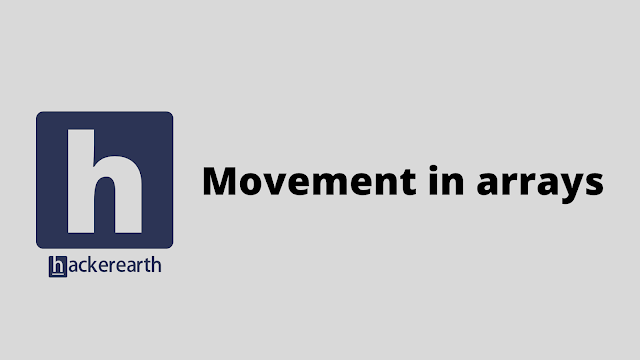In this HackerEarth Movement in arrays problem solution Consider an array A of size N. You start from the index 0 and your goal is to reach index N - 1 in exactly M moves.
At any index, you can move forward or backward by a number of steps that is equal to a prime divisor of the value which exists at that index. You cannot go beyond the array while going forward or backward.
Write a program to determine whether it is possible to reach index N - 1 in M moves.
HackerEarth Movement in arrays problem solution.
#include<bits/stdc++.h>
using namespace std;
vector<vector<bool> > multiply(vector<vector<bool> > a,vector<vector<bool> > b)
{
int i,j,k;
int r1=a.size();
int r2=b.size();
int c1=a[0].size();
int c2=b[0].size();
vector<vector<bool> > c(r1,vector<bool> (c2));
for(i=0;i<r1;i++)
{
for(j=0;j<c2;j++)
{
for(k=0;k<r2;k++)
{
if(a[i][k]&&b[k][j])
c[i][j]=true;
}
}
}
return c;
}
vector<vector<bool> > pow(vector<vector<bool> > a,long long n)
{
if(n==0)
{
assert(0);
return a;
}
if(n==1)
return a;
vector<vector<bool> > b=pow(a,n/2);
b=multiply(b,b);
if(n%2)
b=multiply(a,b);
return b;
}
vector<int> getFactors(int x)
{
vector<int> fact;
if(x%2==0)
{
fact.push_back(2);
while(x%2==0)
x/=2;
}
for(int i=3;i*i<=x;i+=2)
{
if(x%i==0)
{
fact.push_back(i);
while(x%i==0)
x/=i;
}
}
if(x!=1)
fact.push_back(x);
return fact;
}
void eval()
{
int n;
cin>>n;
vector<int> a(n);
for(int i=0;i<n;i++)
cin>>a[i];
int moves;
cin>>moves;
vector<vector<bool> > mat(n, vector<bool>(n));
vector<vector<bool> > graph(1, vector<bool>(n));
graph[0][0]=1;
for(int i=0;i<n-1;i++)
{
vector<int> factors = getFactors(a[i]);
for(int j=0;j<factors.size();j++)
{
int x = factors[j];
if(i-x>=0)
mat[i][i-x]=1;
if(i+x<n) //less than n-1
mat[i][i+x]=1;
}
}
mat = pow(mat, moves);
graph = multiply(graph,mat);
if(graph[0][n-1]==1)
cout<<"YES\n";
else
cout<<"NO\n";
}
int main()
{
int t;
cin>>t;
while(t--)
{
eval();
}
}Second solution
#include<bits/stdc++.h>
using namespace std;
#define rep(i,n) for(i=0;i<n;i++)
#define ll long long
#define elif else if
#define pii pair<ll int,ll int>
#define mp make_pair
#define pb push_back
vector<int>v;
int mv,n;
vector<vector<int> > mul(vector<vector<int> > a,vector<vector<int> > b)
{
int i,j,k,r=a[0].size(),c=a.size();
vector< vector<int> > ans(r);
for(i=0;i<r;i++)
{
ans[i].resize(c,0);
for(j=0;j<c;j++)
{
for(k=0;k<r;k++)
ans[i][j]+= a[i][k]*b[k][j];
}
}
return ans;
}
vector<vector< int > > mat_pow(vector<vector< int > > mat,int n)
{
if(n==1)
return mat;
vector<vector< int > > ans=mat_pow(mat,n/2);
ans=mul(ans,ans);
if(n%2)
ans=mul(mat,ans);
return ans;
}
int foo()
{
int i,j;
vector<vector< int > > mat(n);
for(i=0;i<n;i++)
{
mat[i].resize(n,0);
int fac;
fac=2;
if(v[i]%fac==0)
{
if(i+fac<n)
mat[i][i+fac]=1;
if(i-fac>=0)
mat[i][i-fac]=1;
while(v[i]%fac==0)
v[i]/=fac;
}
for(fac=3;fac*fac<=v[i];fac+=2)
{
if(v[i]%fac==0)
{
if(i+fac<n)
mat[i][i+fac]=1;
if(i-fac>=0)
mat[i][i-fac]=1;
while(v[i]%fac==0)
v[i]/=fac;
}
}
if(v[i]>1)
{
fac=v[i];
if(i+fac<n)
mat[i][i+fac]=1;
if(i-fac>=0)
mat[i][i-fac]=1;
}
}
mat= mat_pow(mat,mv);
return mat[0][n-1];
}
int main()
{
int t;
cin>>t;
assert( t>=1 && t<=10);
while(t--)
{
int i,j,m;
cin>>n;
assert( n>=2 && n<=40);
v.clear();
v.resize(n);
rep(i,n){
cin>>v[i];
assert( v[i]>=1 && v[i]<=1000000);
}
cin>>mv;
assert( mv>=1 && mv<=1000000);
if(foo())
cout<<"YES\n";
else
cout<<"NO\n";
}
return 0;
}






0 Comments